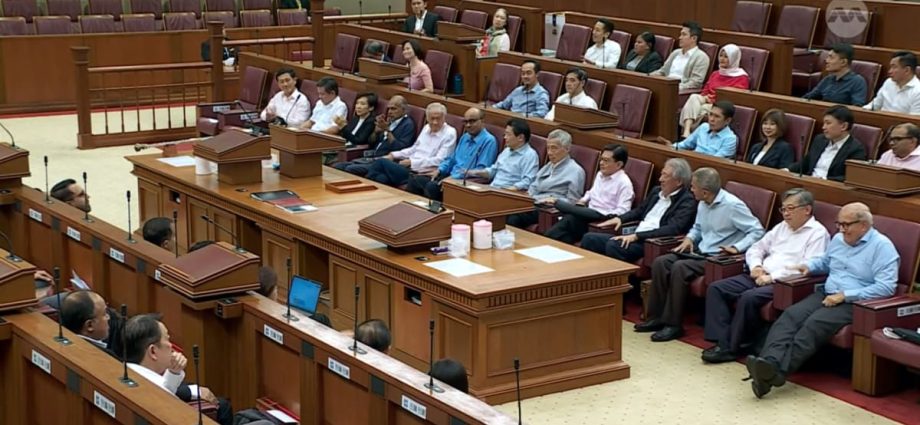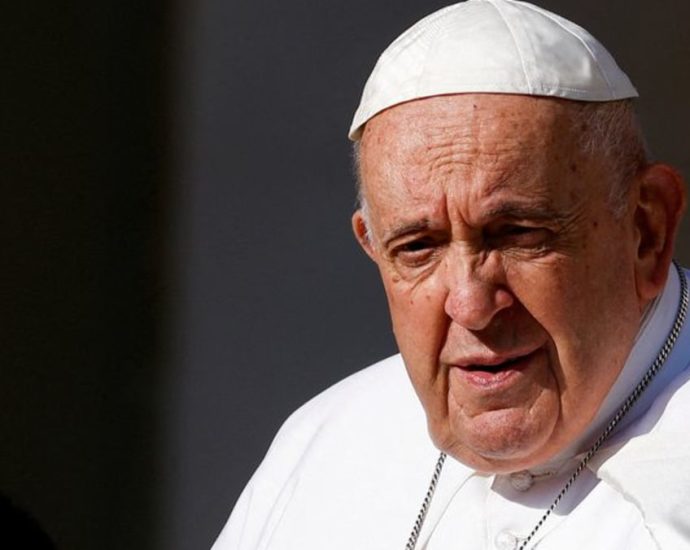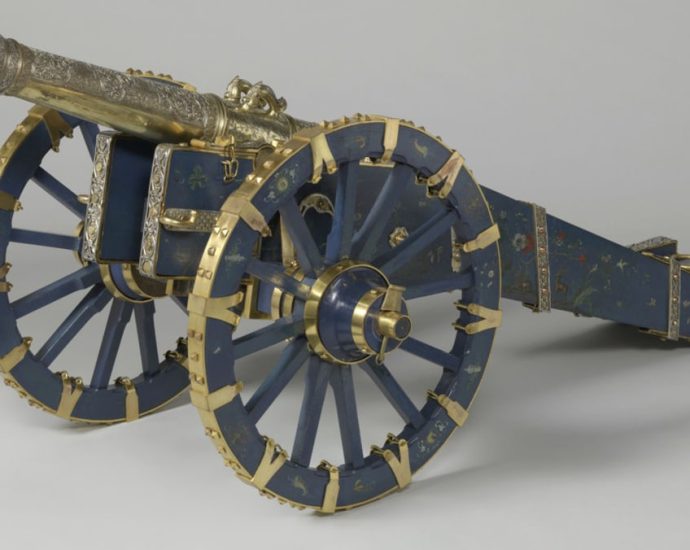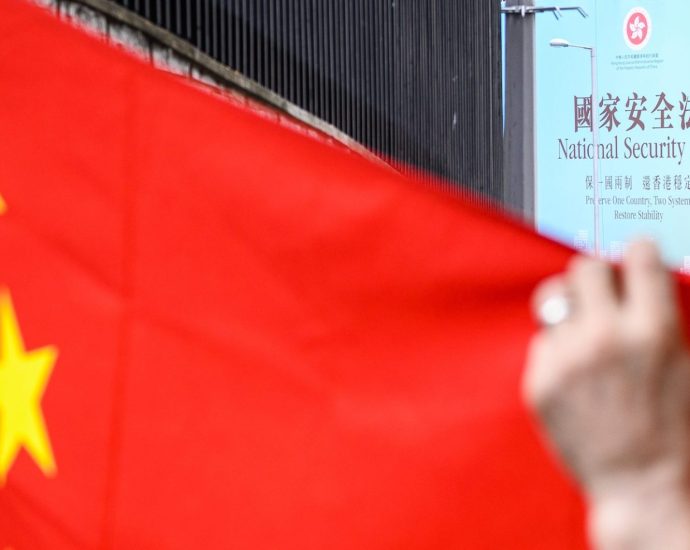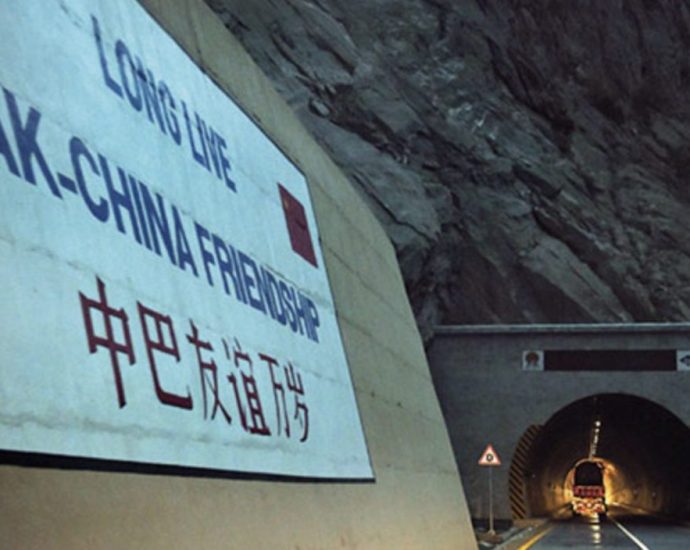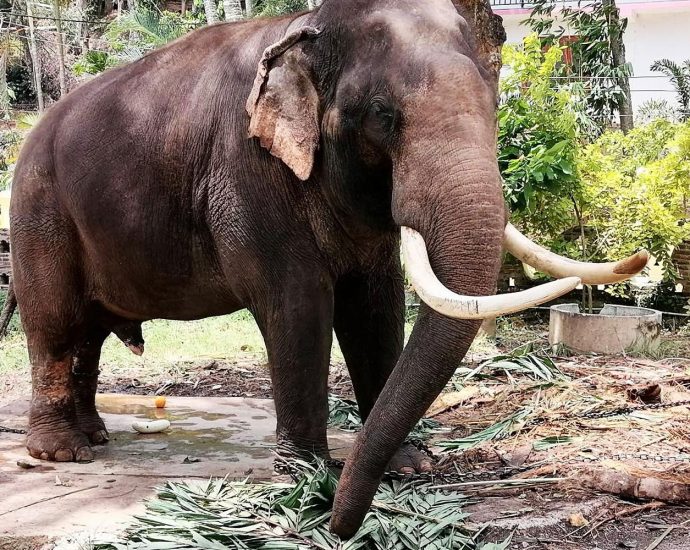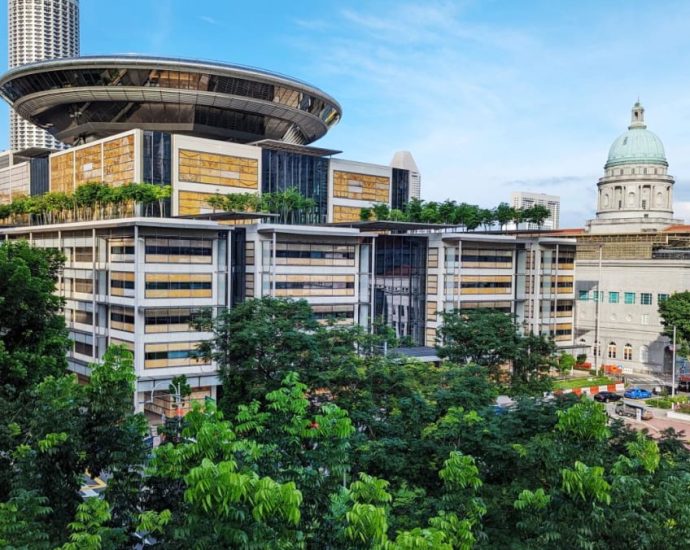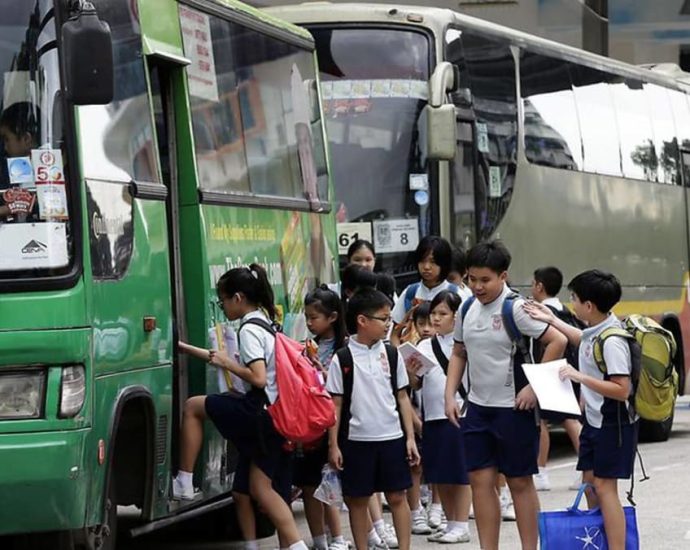Parliament pays tribute to Tharman Shanmugaratnam on his last sitting day
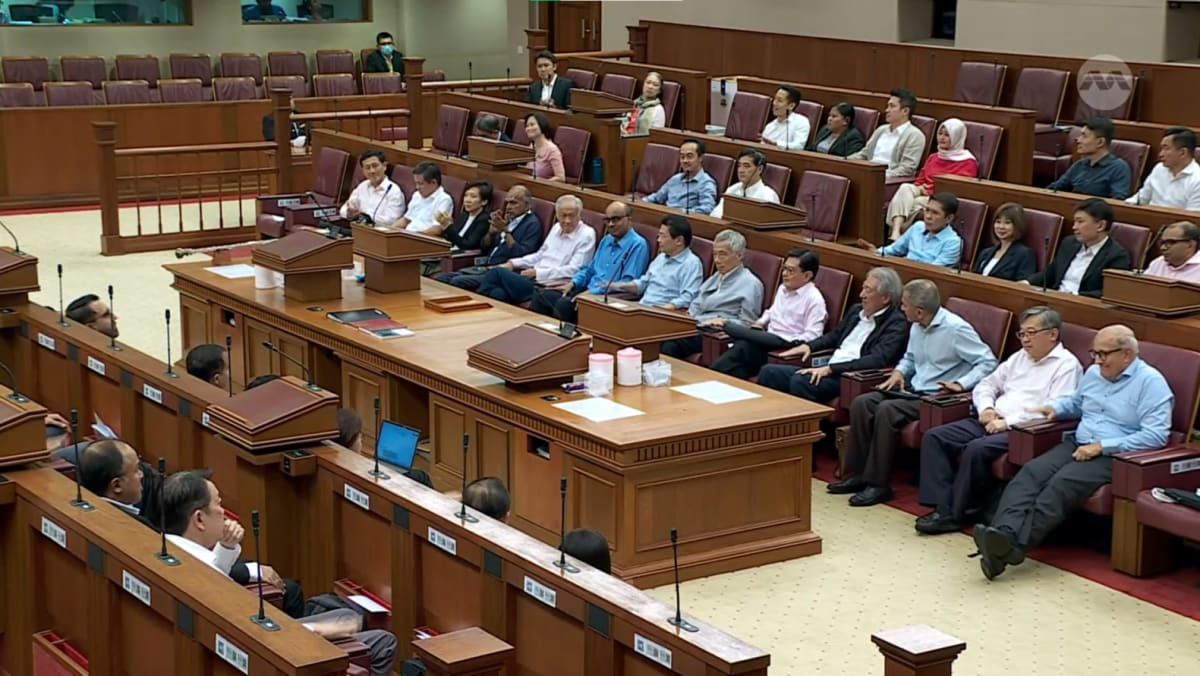
SIMPLIFYING COMPLEX ECONOMIC PRINCIPLES THARMAN’S “GREATEST GIFT”
In a short speech towards the end of Thursday’s sitting, Ms Indranee called Mr Tharman’s ability to simplify complex economic principles as his “greatest gift”.
“I think SM’s (Senior Minister) greatest gift is really in making very complex economic principles sound simple. At least I thought they sounded simple. They sounded very profound; you weren’t quite sure exactly what he was saying, but it sounded like they made a lot of sense,” she said.
“We will miss SM Tharman in this chamber, not least his commanding presence and his erudite speeches,” she added.
“But also (we) will miss his wit and his dry humour. I think, most of all, we will miss a friend and a fellow Member of Parliament.”
Ms Indranee told the House that she and Mr Tharman entered parliament in the same batch in 2001.
Mr Tharman has since held various ministerial appointments, including Minister for Education, Minister for Finance, Deputy Prime Minister, Coordinating Minister for Economic and Social Policies and Senior Minister.
Ms Indranee outlined his various contributions in each role, including seeing Singapore through the global financial crisis of 2007 to 2009 as Finance Minister, removing streaming at primary levels as Education Minister, as well as leading the SkillsFuture programme to encourage lifelong learning and upskilling among Singaporeans in his economic and manpower portfolios.
Mr Tharman also chaired the National Jobs Council during the COVID-19 pandemic to safeguard jobs and create employment and training opportunities for Singaporeans.
RECOGNITION FOR NMPs
Ms Indranee also highlighted that Thursday’s parliamentary sitting marked the end of the term for the current cohort of nine Nominated Members of Parliament (NMPs) and thanked them for their service.
Mr Abdul Samad Abdul Wahab, Ms Janet Ang, Mr Mark Chay, Mr Cheng Hsing Yao, Professor Hoon Hian Teck, Professor Koh Lian Pin, Mr Joshua Thomas Raj, Dr Shahira Abdullah and Dr Tan Yia Swam joined parliament in “most unusual circumstances” in the midst of a global pandemic, said Ms Indranee.
The NMPs covered “several important milestones” during their tenure, she noted.
These include measures to tackle the COVID-19 pandemic and position Singapore for a post-pandemic future, Singapore’s Green Plan, the White Paper on Women’s Development, the repeal of Section 377A and the Constitutional Amendment regarding challenges to the definition of marriage, as well as support for the GST (Goods and Services Tax) Bill.
“They champion causes they care deeply about, ranging from economic growth and employment opportunities, healthcare, sports, and sustainability,” added Ms Indranee.
“They have presented their views passionately and contributed constructively to the robust debates in this House over the last two years. They were also mindful of what this parliament represents and stands for.”
She recalled Mr Cheng’s cut during the Committee of Supply debates earlier this year on “an effective parliament and what that means, as well as the values and principles which underpin it”.
“By their participation in this parliament, they have helped to achieve this current state of affairs,” she added.
“I hope the NMPs will remember their time in parliament fondly, and that they will continue to give close attention to issues of national interest, follow parliamentary proceedings, and contribute to our national building efforts in their personal or professional capacities.”
At least S$480,000 lost in concert ticket scams since January, over 460 in Singapore cheated
They would then contact the scammers via the platform’s in-app messaging function or be redirected to messaging apps such as WhatsApp, Telegram or WeChat to purchase the tickets. When asked if the tickets were authentic, scammers would then provide screenshots and videos of fake tickets or receipts. “To urge victimsContinue Reading
Recovering pope will go to Mongolia, Vatican confirms
VATICAN CITY: Pope Francis will travel to Mongolia at the end of August, the Vatican confirmed on Thursday (Jul 6), indicating that his health is improving well enough after surgery to be able to go to the remotest area he has ever visited. The Vatican issued a detailed schedule forContinue Reading
Dutch museums to return art and artefacts looted from Sri Lanka, Indonesia
THE HAGUE, Netherlands: Two Dutch museums are handing hundreds of cultural artefacts back to Indonesia and Sri Lanka — from a richly decorated cannon to precious metals and jewellery — that were taken, often by force, in the colonial era. The government announced the planned restitution of 478 “cultural objects”Continue Reading
50 consumer complaints filed against e-commerce firm Mdada in span of six months

SINGAPORE: The Consumers Association of Singapore (CASE) has received 50 complaints against e-commerce firm Mdada between Jan 1 and Jun 30, 2023.
These were generally from consumers who did not receive their orders within committed delivery timeframes.
Other complaints included incomplete deliveries, delays in receiving refunds for non-deliveries and defective or incorrect products, CASE President Mr Melvin Yong said in a statement on Thursday (Jul 6).
“CASE has written to Mdada to seek resolution for the outstanding complaints,” he added.
Singapore-based Mdada, founded in September 2020 by hairstylist Addy Lee, actor-host Pornsak Prajakwit and actress Michelle Chia, describes itself as the “fastest-growing and largest” livestream commerce multi-channel in Southeast Asia.
It offers a range of beauty and lifestyle products, as well as luxury items.
According to Mr Yong, at least four consumers are yet to receive orders or refunds as of Tuesday, despite Mdada’s commitment to resolve all outstanding orders by June.
“If Mdada is unable to fulfil outstanding orders or if affected consumers no longer wish to proceed with their orders due to the extended delay, they should effect the refund expeditiously,” he said.
“It is unfair for Mdada to hold on to consumers’ monies indefinitely if they are unable to fulfil the orders.”
On Wednesday, the company posted an apology on Facebook, asking customers to bear with them for “a little more” as they settle “teething issues”.
Mdada said it has “progressively paid out refunds for orders that are out of stock or have experienced inordinate delays in shipments”.
Overseas shipments are being expedited to reach customers as soon as they arrive in Singapore, it added.
“Due to manpower shortage, longer processing time is required, impacting our operations,” said the firm, while promising to ensure communication with customers via WhatsApp to be “as painless as possible, with almost immediate” responses and updates.
CNA has contacted Mdada for more information.
Affected customers may approach CASE for assistance via their website or their hotline at 6277-5100.
Beijing overreaching for exiled HK dissidents
The Hong Kong government has extended its efforts to suppress political dissent overseas, issuing arrest warrants for eight exiled pro-democracy figures and offering bounties of HK$1 million (US$128,000) each.
The targeted pro-democracy figures, who now live in Australia, the US and UK, were selected from a longer list of wanted dissidents. There is a curated feel to their profiles – three ex-legislators, three activists, a unionist and a lawyer – that suggests the list is symbolic, as well as pragmatic.
It is reminiscent of the infamous “Umbrella Nine” trial that capped years of prosecutions after Hong Kong’s 2014 “Umbrella Movement” protests. Three academics, three politicians and three activists were tried and convicted together to send a message to “troublesome” sectors of civil society.
The mugshots of those issued with arrest warrants this week depict not gun-slinging outlaws, but amiable-looking intellectual types.
Their “very serious crimes”, according to police, consist mostly of calling for sanctions to turn the tide of political repression in Hong Kong. In the terms of the controversial national security law under which the warrants were issued, this is considered “subversion of state power”, an offence punishable by up to life imprisonment.
How extradition with Hong Kong works
Hong Kong is nominally a self-governing region of China under the “one country, two systems” model agreed to when the UK handed the territory back in 1997.
However, the national security law was drafted in Beijing and applied to Hong Kong after the tumultuous, protracted protests that gripped the city in 2019. These were prompted, ironically, by fears the region’s autonomy was breaking down.
A curious feature of the national security law is its purported extraterritorial effect. It claims jurisdiction over any person of any nationality who has committed any of its offences anywhere in the world.
Whether the Hong Kong government can realistically bring these people to trial is another matter entirely.
The international law of extradition (technically, in Hong Kong’s case, the surrender of fugitive offenders, as only states engage in extradition) includes certain safeguards. The act must be a sufficiently serious crime in both places, and it must not be a political offence.
The warrants in question fail both of these tests, notwithstanding the Hong Kong government’s hyperbolic claims about national security.
Moreover, extradition is guided by bilateral agreements between jurisdictions. Numerous Western countries, including the UK, US, Australia, Canada and New Zealand, suspended their extradition agreements with Hong Kong when the national security law was imposed, foreseeing the politicization of criminal justice.

The pro-democracy figures targeted this week knew which way the wind was blowing when they left Hong Kong. They will probably never return there, a sad fact to which they may already be reconciled.
However, they may also need to reconsider their travel to jurisdictions which do maintain extradition agreements with Hong Kong or China.
The risk goes beyond formal arrest and extradition. The bounties on offer may encourage vigilantism, and sympathetic governments may turn a blind eye to or even facilitate extra-legal rendition of the eight exiled activists.
This is illustrated by the 2015 case of the five Hong Kong booksellers who disappeared from various locations, including Thailand, and later showed up in China where they “confessed” to crimes in the state media.
The existence of overseas dissidents has long rankled Beijing – as the lifetime of spats with the Dalai Lama illustrates – but in recent years it has shown increased determination to monitor and influence the overseas Chinese diaspora.
The government has even set up secret “overseas police offices” in Europe, North America and elsewhere, as bases for information-gathering and harassment.
Hong Kong brought to heel
In the past, China and Hong Kong could be regarded as distinct political entities, but over the last decade, the “firewall” between the mainland and the region has gradually collapsed. Hong Kong’s government and political system have been stripped of democratic elements, and its national security and law enforcement apparatus are now dictated by the mainland.
Compared with its mainland counterpart, the Hong Kong government goes to greater pains to paper over its actions with a veneer of law and legal process.
However, this tactic is increasingly transparent as it ramps up its pursuit of authoritarian goals. The cooption of Hong Kong’s once-celebrated legal institutions undermines their already-damaged legitimacy.
Hong Kong’s civil society has been brought to heel via a suite of repressive reforms spanning the legal, political, education and media sectors. These new warrants are the latest sign that China will never stop trying to muzzle its critics, so long as they are willing to speak out.
Ultimately, these warrants may be futile overreach – for the sake of their targets, we can only hope that is so – but the intention behind them remains condemnable.
Brendan Clift is Lecturer, The University of Melbourne
This article is republished from The Conversation under a Creative Commons license. Read the original article.
Shanghai Cooperation Organizationâs facade of unity
This week, India virtually hosted the Shanghai Cooperation Organization (SCO) summit, which brought together the most powerful nations across the Asian landmass and beyond. Among those in attendance were no less than Russian President Vladimir Putin, Chinese paramount leader Xi Jinping, and Indian Prime Minister Narendra Modi.
The latest SCO Council of Heads of State meeting was particularly crucial since it formalized the full membership of yet another major Asian power, Iran. In his opening remarks, Modi congratulated the SCO’s latest member while also signaling that Russian ally Belarus could soon also join the power grouping.
Member states also discussed other pressing issues including infrastructure connectivity challenges, cross-border security, insurgency and terrorism, and the increasingly volatile situation in Afghanistan, which shares a border with multiple SCO members.
Putin, the embattled Russian leader who just saw down a mutiny some have characterized as a coup attempt, used the occasion to project strength and expressed hope for greater strategic cooperation with like-minded Asian powers.
Under India’s rotational watch, the SCO was adamant that its expanding ranks do not necessarily signal a budding new military alliance. Yet all key members are committed to facilitating a more multipolar international order.
Despite their shared strategic interests, however, the latest SCO summit also revealed growing tensions among the world’s two largest nations, namely India and China.
Although India has refused to align with the West in the name of non-alignment, Modi implicitly criticized China’s Belt and Road Initiative (BRI) and robust defense ties with Pakistan, India’s archrival.
Reeling from its own festering border disputes with Beijing in the Himalayas, the South Asian powerhouse is also expanding defense cooperation with China’s rivals in the South China Sea, most notably the Philippines, a US treaty ally.

For his part, Putin put on a brave face amid a Wagner Group mutiny, a grinding war in Ukraine and economic recession at home.
Striking a defiant note, the Russian leader claimed that his country is stronger than ever, as it “counters all these external sanctions, pressures and provocations and continues to develop as never before.”
“I would like to thank my colleagues from the SCO countries who expressed support for the actions of the Russian leadership to protect the constitutional order and the life and security of citizens,” Putin told his SCO colleagues in a televised address from the Kremlin, referring to expressions of diplomatic support by neighboring states at the height of Russia’s political crisis last month.
SCO members such as India and China have been crucial to Russia’s economic resilience in the face of Western sanctions.
Russo-Chinese trade has exploded on a year-on-year basis. In the first five months of this year, bilateral trade totaled more than US$93.8 billion, making a 40.7% increase on an annual basis. Meanwhile, India has rapidly become Russia’s largest oil customer, just as Western economies have punitively scaled back their Russian energy imports.
Russia hopes that the inclusion of Iran, another major strategic partner that is also battling Western sanctions, would further enhance its pivot to Asia by facilitating the creation of a pan-regional trade and infrastructure development regime, with Central Asian SCO members as the geographic linchpin.
Putin was also visibly pleased by the vocal support of his most powerful SCO ally. China, the organization’s founding member, called for a new global order beyond the dictates of the West. Chinese paramount leader Xi Jinping firmly stood by his Russian ally and, accordingly, accused the West of a “narrow-minded” and zero-sum approach to 21st century geopolitics.
“We should truly respect each other’s core interests and major concerns, and firmly support each other’s endeavor for development and rejuvenation. We should keep in mind the overall and long-term interests of our region, and make our foreign policies independently,” Xi told his SCO colleagues.
“We must be highly vigilant against external attempts to foment a new Cold War or camp-based confrontation in our region. We must resolutely reject any interference in our internal affairs and the instigation of ‘color revolutions’ by any country under whatever pretext,” he added, underscoring the need for solidarity among Eastern powers in face of supposed Western aggression.
Although committed to a more multipolar international order, India has a radically divergent strategic calculus than its Russian and Chinese SCO counterparts. For starters, the South Asian powerhouse, which is also a member of the Quadrilateral Security Dialogue (“Quad”) along with the US, Australia and Japan, does not face any Western sanctions.
By and large, the West has relented in the face of India’s insistence on continuing its robust trade and defense ties with Russia. If anything, the West is focused on providing carrots rather than sticks in its dealings with India.
During his recent visit to the White House, Indian Prime Minister Narendra Modi signed onto a series of defense deals, which are explicitly designed to reduce his country’s historical dependence on Moscow.
India’s divergent outlook was clearly on display during the SCO summit. On one hand, Modi implicitly criticized China’s BRI, refusing to back the infrastructure development initiative embraced by all other SCO members.
“Strong connectivity is crucial for the progress of any region. Better connectivity not only enhances mutual trade but also fosters mutual trust,” said the Indian leader while not mentioning either the BRI or China explicitly.
“However, in these efforts, it is essential to uphold the basic principles of the SCO charter, particularly respecting the sovereignty and regional integrity of the member states,” he added, effectively echoing “debt trap” accusations against China’s signature infrastructure initiative.

If anything, the Indian leader also took a jab at China’s warm ties with neighboring Pakistan. During the SCO meeting, where both the Chinese and Pakistani leaders were in attendance, Modi warned against the “use [of] cross-border terrorism as an instrument” of foreign policy, referring to allegations that Pakistani intelligence elements have been involved in violent operations inside India.
Growing geopolitical differences stretch way beyond India’s own backyard. New Delhi is now actively backing China’s rivals in Southeast Asia. Earlier this year, the South Asian power officially kicked off negotiations for the sale of BrahMos supersonic missiles to Vietnam, which has long been at loggerheads with China in the South China Sea.
Just days ahead of the SCO summit, India also held high-stakes bilateral strategic dialogue with the Philippines, another major claimant state in the Beijing-claimed waters.
Following its acquisition of the BrahMos missle system last year, Manila is intent on further expanding military cooperation with the South Asian powerhouse. Anticipating booming ties, India is set to dispatch its first-ever defense attaché to Manila.
During the 5th India-Philippines Joint Commission on Bilateral Cooperation meeting in New Delhi last week, co-chaired by External Affairs Minister S Jaishankar and Secretary for Foreign Affairs of the Philippines Enrique Manalo, India reiterated its support for the Manila-initiated arbitral tribunal award at The Hague in 2016, which rejected Beijing’s expansive claims in the South China Sea as incompatible with the United Nations Convention on the Law of the Sea (UNCLOS).
In a joint statement, India and the Philippines underscored the “need for peaceful settlement of disputes and for adherence to international law, especially the UNCLOS and the 2016 Arbitral Award on the South China Sea in this regard.”
Follow Richard Javad Heydarian on Twitter at @Richeydarian
Parks chief: No policy to reclaim Thai âambassador elephantsâ
Repatriation of Sak Surin was a special case agreed on by Thai and Sri Lankan governments

The government has no policy to reclaim Thai “ambassador elephants” in Sri Lanka, says Atthapol Charoenchansa, acting chief of the Department of National Parks, Wildlife and Plant Conservation (DNP).
Mr Attapol was responding on Thursday to reports by local media in Sri Lanka that the Sri Lankan government would sue Thailand if it wanted to bring back two male elephants — Pratu Pha and Srinarong — that were sent as goodwill gifts in 2001.
Earlier, the ailing Thai elephant Sak Surin was flown from Sri Lanka to Chiang Mai on Sunday after living there for 22 years. The 30-year-old jumbo is now under the care of the Elephant Conservation Centre in Lampang province.
Sak Surin is one of three Thai elephants gifted to Sri Lanka in 2001 as a goodwill ambassador for the country. He changed hands many times before ending up at Aluthgama Kande Viharaya in the south of Sri Lanka, where he carried holy relics during annual Buddhist parades.
Mr Attapol said Thailand had not “reclaimed” Sak Surin, stressing that the repatriation of the ailing jumbo was made under a diplomatic agreement. Both countries agreed to have the animal receive medical treatment in Thailand.
He also insisted there was no rift between the two countries over the repatriation of the elephant.
Natural Resources and Environment Minister Varawut Silpa-archa has given clear guidelines that Thailand would coordinate with veterinary faculties at universities in Sri Lanka to help take care of Thai ambassador elephants, said Mr Attapol.
As for other Thai elephants living abroad, a survey must be conducted to see their living conditions as well as determine measures to take care of them, said the acting DNP chief.
On Friday, deputy DNP director-general Rungnapa Phatthanawiboon will hold a meeting of a sub-panel on elephants at the Ministry of Agriculture and Cooperatives to discuss the sending of goodwill ambassador elephants, said Mr Attapol. Conclusions will be forwarded to the National Committee on Elephants, he added.
Defence grills stepmother of 5-year-old girl allegedly murdered by father
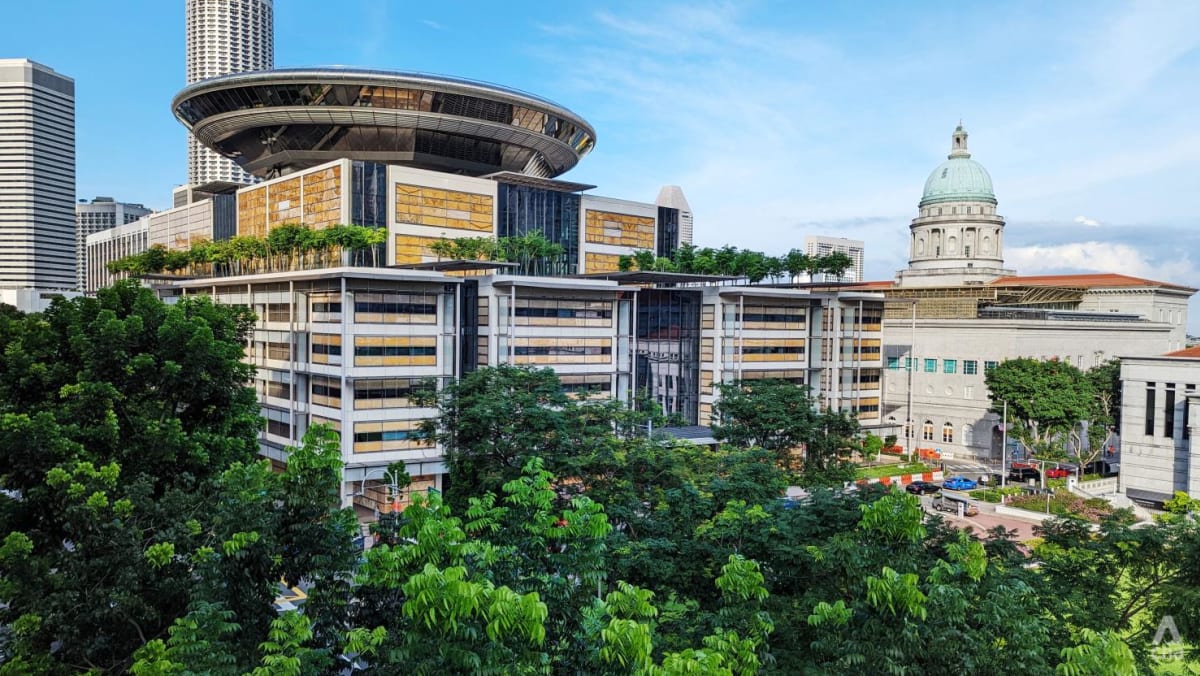
He put it to the man’s wife that she was shown pushing the bookshelf to close up the naughty corner space, but she disagreed, saying she did not know why she did that.
The lawyer pointed out that the woman was shown resting her hand on the bookshelf while her husband was beating the girl up.
“My instructions are that during that period of time, you were complaining to (the accused) about (the deceased’s) behaviour. Do you agree or disagree?” asked Mr Cheong.
“I cannot remember,” answered the woman.
“At that point in time, did you think about comforting (the deceased)?” asked the lawyer.
“I cannot remember anything on that day. What I did, or what I said, or what I think,” said the woman.
“Because you walked away, you actually did not feel sorry for (the deceased) at all,” asserted the lawyer.
“My answer is still – I don’t know. I cannot remember how I feel,” replied the woman.
The lawyer then played footage where the accused reached behind him to get a cane that was resting on the bookshelf. After this, he strikes his daughter repeatedly with it.
Mr Cheong asserted that woman had walked in and out of the video frame because she was trying to pass the cane to her husband, but left when she saw that he already had it.
The woman again said she could not remember why she went in and out.
Mr Cheong then played another video clip which showed the accused pushing his daughter and son in a pram down a corridor towards his flat.
The two children were shown to be subdued, staring at their stepmother, who was filming the video and silently following instructions to sit down or stand up.
In the background, cooing sounds could be heard and the accused’s legs could be seen as he lay on a mattress. He shared that mattress with his wife and her two baby daughters.
THE WAY SHE ADDRESSED THE KIDS
In the video, the man’s wife can be heard talking to the man’s children.
She referred to the girl as “Eh” or “A”, and to the boy as “guy”.
“Why did you not call (the deceased) by her name?” asked Mr Cheong.
“On that particular day, I don’t know why. But I did call sometimes by her name,” answered the woman.
“So sometimes you call her by her name, most of the time you just refer to her as ‘eh’?” asked the lawyer.
“No. Sometimes I just … didn’t even talk to her,” answered the woman.
The woman had been shown in video footage calling her stepson “jantan”.
“The Malay word ‘jantan’ is actually a disrespectful way of referring to a male person, do you agree or disagree?” asked Mr Cheong.
“No,” replied the woman.
The lawyer also showed the woman a video of the girl playing with her milk bottle and suggested to the woman that she had taken this video to send to the accused, because she wanted him to come home and punish the girl.
The woman disagreed.
She also disagreed with the lawyer’s suggestion that she was jealous of her husband’s two kids.
The trial continues, with the first tranche set to end this Friday and resume again in September.
If convicted of murder under Section 300(c), the man can be sentenced to death, or to life imprisonment with caning.
CNA Explains: The challenges school bus operators face and why they need parents to pay more
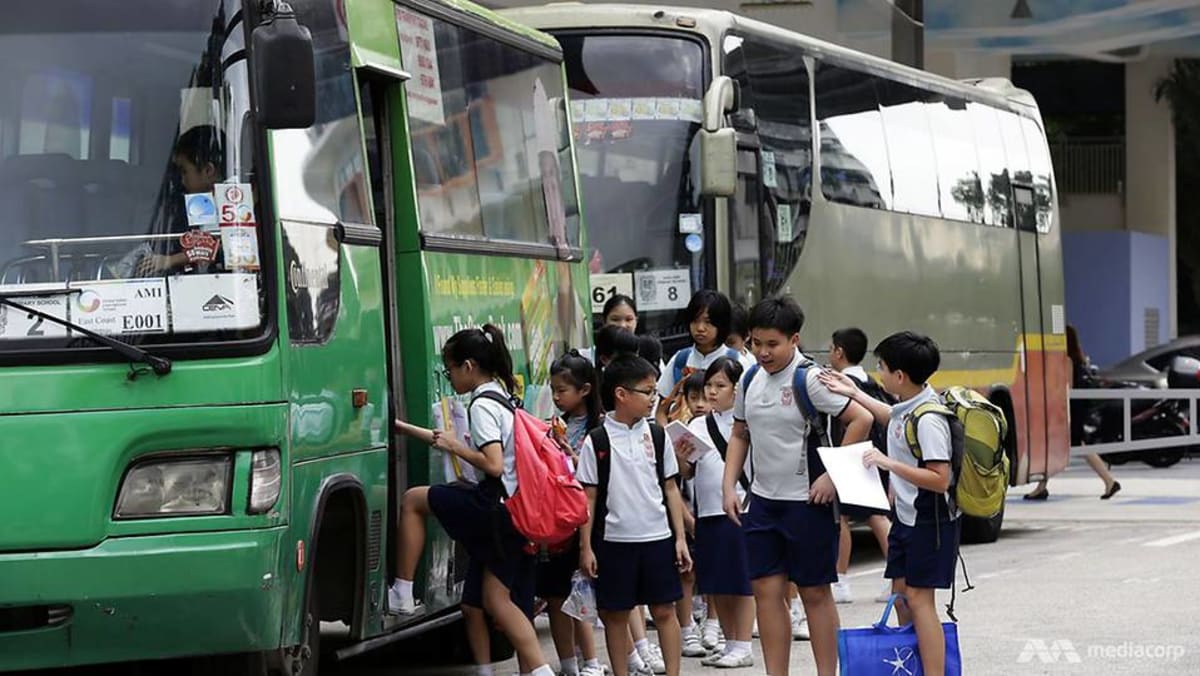
LACK OF DEMAND, HIGH COSTS
The costs of running a bus service are high, and providing school bus services rarely covers them, said the industry players.
It is the supplementary income from transporting workers and tourists that keeps the school bus business “viable”, said Mr Adrian Yeap, CEO of bus company Yeap Transport.
“No school bus operator can survive on just school bus fare in Singapore,” he told CNA’s podcast Heart of The Matter.
Previously, school bus operators had pupils in the morning session and the afternoon session to cater to, but things changed after the move to a single session in 2000.
“The price did not catch up,” said Mr Yeap.
For instance, if it costs S$100 a day to run the service today, what he may earn from three trips may be S$30, he said.
To earn the remaining money just to break even, he will have to drive more, he noted.
“How many more hours do you want the school bus driver who’s responsible for the very life of your children at the back to drive?” he asked.
“The poor bus driver has to drive many hours in order to make ends meet,” he added.
EXPECTATIONS OF LOW FEES
The industry is also limited by parents’ perceptions on how much school bus services are worth, bus owners said.
“A lot of the parents have a mindset that they are willing to pay this much,” said Mr Darry Lim, spokesman from the Singapore School Transport Association.
Parents of children in local primary schools currently typically pay between S$110 and S$180 per month for nine months, he told Heart of The Matter.

